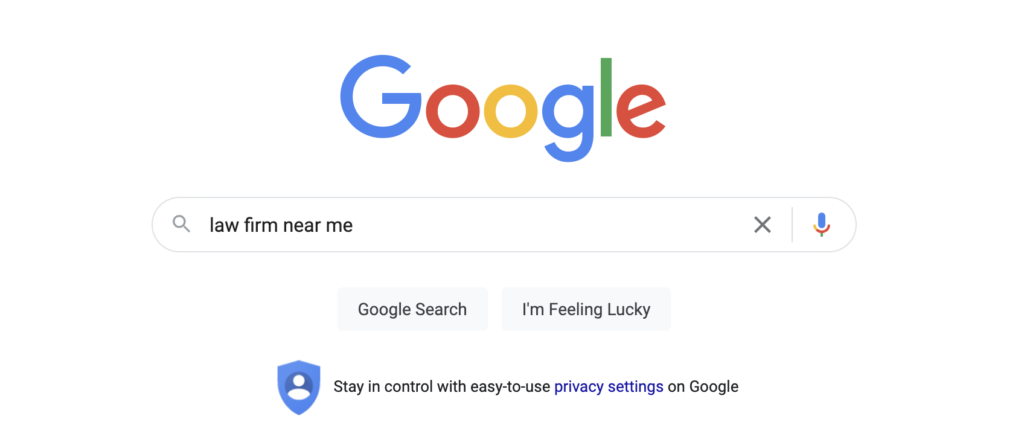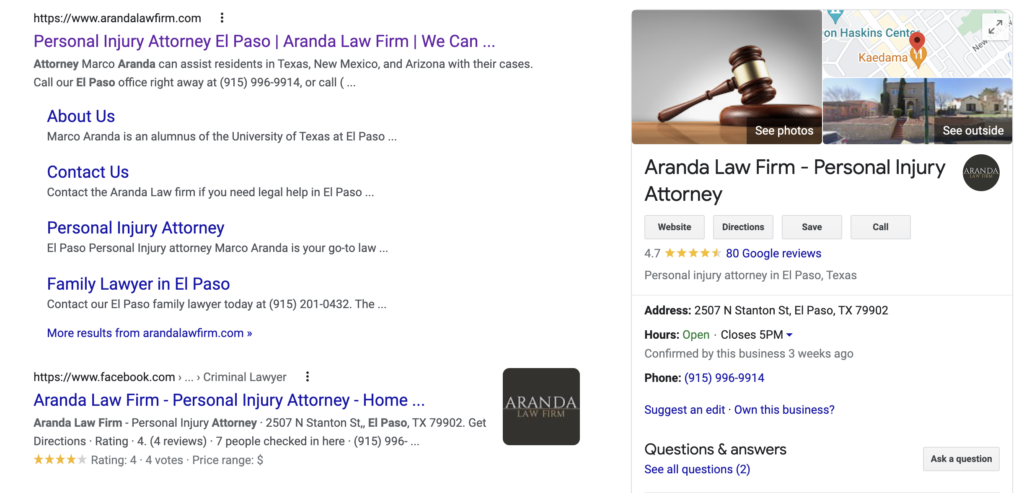You want an increase in legitimate, high-quality clients. Although word-of-mouth and client referrals have brought you some success, it just isn’t cutting it anymore. So how, in the highly competitive legal industry, do you get potential clients to contact your firm rather than your competitors? The answer is actually quite simple. Develop and implement a comprehensive digital marketing strategy that includes search engine optimization (SEO.)
Table of Contents
Introduction to SEO for Law Firms
The term “SEO” stands for search engine optimization and is a fundamental component of a law firm’s marketing strategy. By implementing an SEO strategy, your law firm will rank higher in Google’s organic (unpaid) search results. With a higher Google ranking, your firm will be more visible to searchers, getting you more leads and, ultimately, more clients.
Why is Lawyer SEO So Important?
Simply put, SEO is a series of proven methods that gets your website, or certain pages on your site more visibility on the search engine results pages (SERPs) with the ultimate goal of being on the first page.
The legal industry is one of the most competitive when it comes to SEO, with law firms doing all they can to get onto the first page of Google, and for very good reason.
96% of people seeking legal advice use a search engine.
75% of all users never scroll past the first page of Google.
60% of all clicks go to the first three organic search results.
Although there are other ways to advertise, such as pay-per-click (PPC) advertising and pay-per-lead ads (LSAs), there is really no substitution for search engine optimization. But keep in mind that you will need a good amount of time, effort, and patience while developing, implementing, and maintaining an SEO strategy before you truly reap its benefits.
Ranking Factors for Lawyer SEO
Google’s main objective is to provide the most accurate, credible, authoritative, and relevant information to its users. To achieve this goal, Google focuses on its accuracy by constantly assessing and tweaking its algorithms, looking at each website using a number of factors, known as “Google ranking factors.”
Google has over 200 factors it uses when ranking websites. At AGI Marketing, we consider the following to be the most critical:
- User Experience
- High-Quality Content
- Mobile Friendly
- Keyword Optimization
- Crawlability
- Page Loading Speed
- Search Intent
- Internal Links
- External Links
- Optimized Business Listings
- Website Structure
- Website Security
Law Firm Keyword Research
SEO keywords for lawyers are the words and phrases within your website’s content that helps users find your site when performing a search on Google or other search engines.
No matter how extensive your search engine optimization strategy is, its success is ultimately based on your keyword selection. If you choose the right keywords, internet users will visit your site and likely reach out. If you choose the wrong keywords, a potential client will not even see your site and end up clicking on a competitor’s site instead.
So how do you know what keywords to choose? Below are some helpful tips for selecting the right keywords:
- Think like a client – Put yourself in the shoes of your target audience. What would they be looking for – and ultimately searching for. You can consult others, such as others within your firm, family, and friends, to get their opinion on phrases potential clients would likely be searching for on Google.
- Look at your competitors – Make a list of your direct competitors and visit their websites. Read through the pages, noting keywords within their content. Looking at your competitors’ keywords will give you additional insight and new keyword ideas.
- Incorporate long-tail keywords – Long-tail keywords are those with three or more words, such as “The best dui lawyer in El Paso, Texas.” While they normally have lower search volumes, they are typically less competitive, attract more relevant traffic, and are easier to rank well on.
- Use keyword research tools – These tools, such as Moz Keyword Explorer and Semrush Keyword Tools, help you find and create lists of relevant keywords based on your practice. With these tools, you can gather information on keyword trends, keyword competition, and similar keywords.
- Analyze the results – Once you choose your keywords, don’t forget to look at how they are performing. Some may perform better than others over time and as new trending keywords arise, you will need to continually make adjustments.
Content Marketing for Lawyers
Content marketing is a strategic and effective marketing approach that is focused on creating relevant, informative, and engaging content to attract new clients to your firm. This content should include:
- Practice area pages
- Attorney profile pages
- Blog posts and articles
- FAQ pages
- Case studies
- How-to guides
- E-books
- Videos
- Infographics
Practice area pages are the most important pages on your site. For SEO purposes and more successful targeting, create a page for each of your practice areas – and get specific. It is also a good idea to create a dedicated practice area page for every location you are targeting. For example, take a look at the following content structure.
What Google Looks For When Ranking Legal Content
In Google’s endless quest to bring the highest quality, most relevant results to its users based on their search queries, evaluating content quality is among Google’s highest priorities. So how do you create content that Google – and your audience loves? Well, let’s look at Google first. In our experience, Google looks for the following:
- High-quality, informative content
- Original content with no duplication
- Content that is well-written and easy to read
- Informative content that provides valuable, in-depth insight into the topic
- Content that is recent or updated and consistently posted
When creating content, keep in mind that it needs to answer a potential client’s questions and addresses their needs. And although you want to show you know what you are talking about, your content should not be written using lawyer jargon but instead be easy for the average person to understand.
On-site Optimization for Law Firms
On-site SEO involves improving a website’s structure, content, and code to make it search engine friendly. It refers to all of the techniques that can be used on the website itself to improve its rankings on Google. Most onsite optimization will need to be addressed with your web developer. However, here are some key components of on-site optimization.
- Content optimization
- Relevant and compelling headlines
- HTML tags, including title and header tags
- Meta description (a description of what the page is about)
- Image optimization
- Internal linking
Off-site Optimization for Lawyers
As you probably guessed, off-site optimization is everything your digital marketing agency can do elsewhere than on your website to increase your Google rankings. Off-site SEO includes:
- Content marketing (publishing content elsewhere online)
- Social media
- Google Business Profile (formerly Google My Business)
- Forum contributions
- Brand building
- Link building
- Podcasts
- Reviews
- Industry-specific directories
Local Law Firm SEO
Local SEO is a critical part of search engine optimization as most law firms serve clients in a specific geographic area. The strategy involves optimizing your website for someone looking for a service in your area or using a localized search term, such as “Personal Injury Lawyer in Seattle.”
Local search engine optimization begins at the foundation of all digital marketing – your website. You will need to make sure your site is functional, fast, and SEO-friendly. Since most people use their cell phones to search for local services, you need to make sure your site is mobile-friendly.
Next, you will need to produce content that uses localized keywords, such as practice area pages that include terms like “Seattle Personal Injury Lawyer” or “Personal Injury Attorneys in Seattle.” It is also best to have a blogging strategy that incorporates topics local users may be interested in. For example, you can post a blog titled, “What Should I Do After a Seattle Car Accident?”
Google Business Profile (Formerly Google My Business)
An essential part of any local SEO plan is claiming and optimizing your Google Business Profile, formerly known as “Google My Business.” This free listing is one of the top factors used by Google to rank your law firm in organic search results. It is part of Google Maps, the first organic section on the first search engine results page.
Getting your GBP listing to show in the first three positions in the maps section, known as the “local pack,” will drastically increase your visibility. And with a high number of great reviews, your GBP profile will also relay credibility and trustworthiness to those searching for your services.
So, how do you get your GBP to increase the quantity and quality of leads? Well, you will need to take the following measures to properly optimize your listing and take full advantage of all it has to offer.
- Claim your profile
- Enter your firm’s name, address, and phone number (NAP) and make sure they are correct
- Choose the right business category
- Link your website
- Include your hours of operation
- Add messaging so potential clients can connect with you
- Upload photos, including both the interior and exterior of your office
- Establish a steady stream of positive reviews
- Add a description of your firm
- Include a question and answer section
Online Reputation Management and Soliciting for Reviews
Recent data shows that 87% of people consider online reviews before selecting a lawyer. With nearly 9 out of 10 potential clients looking at your ratings, it is critical to have a high number of reviews and an excellent overall score. Your review scores can make or break you, so you need to act fast.
As we all know, it is much more likely for a dissatisfied client to leave a review than a client who was happy with your representation. It is unfortunate, but it is true.
For this reason, it is important to get your satisfied clients to post positive reviews on sites such as Google and Yelp. You can actively solicit reviews by reaching out to past and current clients via phone, text, or email, asking them to submit a review. Many will go ahead and leave you a review, though some need a reminder or two. Be sure to follow up with those who have yet to leave a review with another call, text, or email asking politely for their assistance.
Potential clients frequently look at your responses to both positive and negative reviews. Thank your clients who have left positive reviews. However, make sure you don’t ignore the negative ones. In responding to a negative review, be sure to:
- Respond quickly
- Acknowledge their concerns
- Apologize and empathize with the reviewer
- If needed, provide an explanation and take responsibility
- Invite them to contact you off-line to discuss the matter further.
Be sure to keep your entire interaction professional. Potential clients expect to see a negative review from time to time. But they do, however, pay close attention to the manner in which an individual or business responds to that review.
Performance Metrics for Lawyer SEO
With any law firm marketing strategy, the secret is to continually measure your campaign’s performance and adjust your efforts accordingly to ensure it is as successful as possible.
The problem is you must be patient because SEO strategies take time. But you can rest assured, knowing the reward is definitely worthwhile.
There are several metrics to look at to see just how successful your SEO efforts are. They include:
- Conversions – the number of visitors generated by your SEO efforts who complete a specific action, such as scheduling an appointment.
- Average time on page – this is simply the average amount of time a visitor spends on a single page on your website
- Keyword rankings – your website’s placement on the search engine results page for a particular search query
- Page speed – a measurement of the time it takes for a web page to load
- Organic visibility – a score relating to how visible your site is in the organic search results
- Organic sessions – anytime a user (who found your site organically) actively engages with your website
Taking the time and effort to look at this data will help you quickly identify positive and negative trends within your SEO strategy, identify the areas that need your attention, and adjust your efforts accordingly.
Should You Hire a Digital Marketing Agency to Help with Your Law Firm’s SEO?
We understand that many lawyers don’t enjoy the business and marketing side of things. You became a lawyer not to sell yourself but to practice law.
Unfortunately, in today’s world, attracting new clients online is a large part of what attorneys need to do in order to do what they truly love – representing their clients in their legal matters.
Maybe you thoroughly dislike handling your marketing efforts or simply don’t have the time to spend creating and implementing a strategy. In any case, partnering with a digital marketing agency and letting them handle your online marketing efforts for you can be a great option. An agency can:
- Perform market research and create a strategy specific to your firm and area.
- Create a professional, optimized website that is user-friendly.
- Plan and create content that engages users and drives traffic to your site
- Manage and optimize your placement on Google
- Claim, update, and optimize your Google Business Profile
- Install tracking and analytics to measure your SEO strategy’s success
- Closely monitor the results of your campaign and make changes as needed.
In addition to handling all aspects of your law firm’s SEO, a digital marketing agency can also:
- Create and manage your local service ads and pay-per-click campaigns
- Manage your organic and paid social media efforts
- Claim, optimize, and manage your legal directory listings
AGI, A Digital Marketing Agency for Lawyers
At AGI Marketing, we create and implement digital marketing strategies in line with your needs, goals, and budget. With our extensive experience assisting law firms with their online marketing, we understand what works and what doesn’t. Our experienced team looks carefully at your practice areas, competition, and target market and only implements the digital marketing tools that will get you the best results possible – and the most bang for your buck.
We take the guessing game out of digital marketing and help you get the results you want. To learn more about search engine optimization and how digital marketing can take your firm’s success to the next level, we welcome you to contact AGI today.















